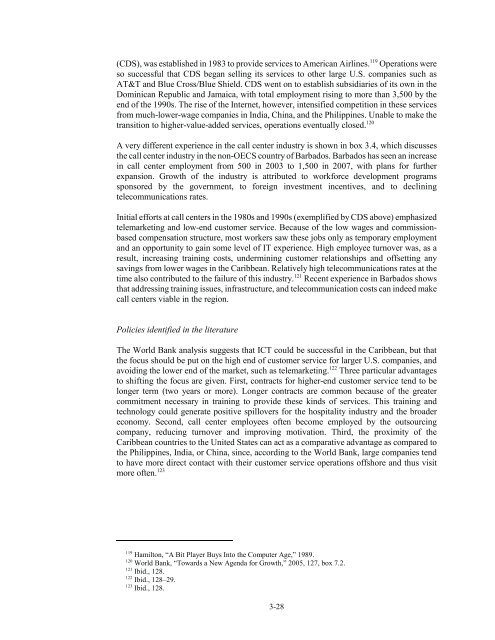Caribbean Region: Review of Economic Growth and ... - USITC
Caribbean Region: Review of Economic Growth and ... - USITC
Caribbean Region: Review of Economic Growth and ... - USITC
Create successful ePaper yourself
Turn your PDF publications into a flip-book with our unique Google optimized e-Paper software.
(CDS), was established in 1983 to provide services to American Airlines. 119 Operations wereso successful that CDS began selling its services to other large U.S. companies such asAT&T <strong>and</strong> Blue Cross/Blue Shield. CDS went on to establish subsidiaries <strong>of</strong> its own in theDominican Republic <strong>and</strong> Jamaica, with total employment rising to more than 3,500 by theend <strong>of</strong> the 1990s. The rise <strong>of</strong> the Internet, however, intensified competition in these servicesfrom much-lower-wage companies in India, China, <strong>and</strong> the Philippines. Unable to make thetransition to higher-value-added services, operations eventually closed. 120A very different experience in the call center industry is shown in box 3.4, which discussesthe call center industry in the non-OECS country <strong>of</strong> Barbados. Barbados has seen an increasein call center employment from 500 in 2003 to 1,500 in 2007, with plans for furtherexpansion. <strong>Growth</strong> <strong>of</strong> the industry is attributed to workforce development programssponsored by the government, to foreign investment incentives, <strong>and</strong> to decliningtelecommunications rates.Initial efforts at call centers in the 1980s <strong>and</strong> 1990s (exemplified by CDS above) emphasizedtelemarketing <strong>and</strong> low-end customer service. Because <strong>of</strong> the low wages <strong>and</strong> commissionbasedcompensation structure, most workers saw these jobs only as temporary employment<strong>and</strong> an opportunity to gain some level <strong>of</strong> IT experience. High employee turnover was, as aresult, increasing training costs, undermining customer relationships <strong>and</strong> <strong>of</strong>fsetting anysavings from lower wages in the <strong>Caribbean</strong>. Relatively high telecommunications rates at thetime also contributed to the failure <strong>of</strong> this industry. 121 Recent experience in Barbados showsthat addressing training issues, infrastructure, <strong>and</strong> telecommunication costs can indeed makecall centers viable in the region.Policies identified in the literatureThe World Bank analysis suggests that ICT could be successful in the <strong>Caribbean</strong>, but thatthe focus should be put on the high end <strong>of</strong> customer service for larger U.S. companies, <strong>and</strong>avoiding the lower end <strong>of</strong> the market, such as telemarketing. 122 Three particular advantagesto shifting the focus are given. First, contracts for higher-end customer service tend to belonger term (two years or more). Longer contracts are common because <strong>of</strong> the greatercommitment necessary in training to provide these kinds <strong>of</strong> services. This training <strong>and</strong>technology could generate positive spillovers for the hospitality industry <strong>and</strong> the broadereconomy. Second, call center employees <strong>of</strong>ten become employed by the outsourcingcompany, reducing turnover <strong>and</strong> improving motivation. Third, the proximity <strong>of</strong> the<strong>Caribbean</strong> countries to the United States can act as a comparative advantage as compared tothe Philippines, India, or China, since, according to the World Bank, large companies tendto have more direct contact with their customer service operations <strong>of</strong>fshore <strong>and</strong> thus visitmore <strong>of</strong>ten. 123119 Hamilton, “A Bit Player Buys Into the Computer Age,” 1989.120 World Bank, “Towards a New Agenda for <strong>Growth</strong>,” 2005, 127, box 7.2.121Ibid., 128.122Ibid., 128–29.123 Ibid., 128.3-28
















